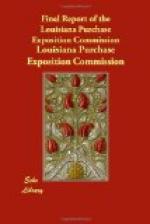a large residue whose occupants are even now loudly
clamoring for statehood.
Instead of the 50,000 white settlers who occupied this domain in 1803, it now contains 15,000,000 of industrious, enterprising, intelligent Americans, constituting about one-fifth of the population of all our States; and these are defiantly contesting for premiership in wealth and material success with the oldest of our States, and are their equals in every phase of advanced intelligence and refined civilization.
The States which composed the Union when its possessions were so greatly extended have since that time seen the center of the nation’s population carried more than 500 miles westward by the swift and constant current of settlement toward this new domain; and the citizens of these States have been flocking thither, “new brethren to partake of the blessings of freedom and self-government,” in multitudes greater than even Jefferson would have dared to foretell.
I shall not enter the field of statistics for the purpose of giving details of the development of the territory acquired under the treaty we commemorate. I have referred to such development in some of its general features by way of suggesting how distinctly the century just ended gives assurance of a startling and superabundant final fulfillment of the prophecies of its beginners.
The supreme importance of the Louisiana purchase and its value as a national accomplishment, when seen in the incidents of its short history and in the light of its present and prospective effects, and judged solely by its palpable and independent merits, can not be better characterized than by the adoption of the following language from the pen of a brilliant American historian: “The annexation of Louisiana was an event so portentious as to defy measurement. It gave a new face to politics and ranked in historical importance next to the Declaration of Independence and the adoption of the Constitution, events of which it was the logical outcome. But as a matter of diplomacy it was unparalleled because it cost almost nothing.”
How fitting on every ground it is that the centennial of this stupendous event should be joyously and appropriately celebrated; and that it should be celebrated here in the most populous of the States created from the territory which the Louisiana purchase gave to us. And how in keeping it is with the character of this acquisition and with its purpose and mission that our celebration should not waste itself on the pomp and pageantry that belongs to the triumphs and spoils of war, or to the rapacious dispossessions of ruthless conquest. Every feature of our celebration should remind us that we memorialize a peaceful acquisition of territory for truly American uses and purposes; and we should rejoice not only because this acquisition immediately gave peace and contentment to the spirited




